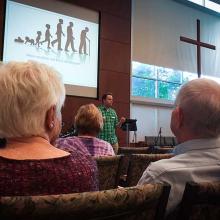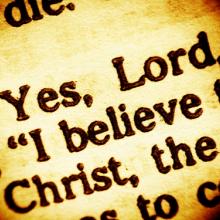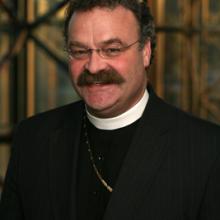lutheran
I AM TERRIFIED of tripping. Thanks to a couple memorable tumbles over the years—the most recent of which involved a face-plant while on a run—I always double-knot my shoelaces and look down at my feet when I walk. Remaining steady and stable is always in the back of my mind.
But on a trip to Berlin in 2017, I found myself repeatedly tripping over something in the ground. The source of my stumbling, I soon learned, were Stolpersteine, which translates literally to “stumbling stones,” or more metaphorically, “stumbling blocks.” Stolpersteine are cobblestone-sized bronze plaques embedded in streets and sidewalks throughout Europe, each slightly raised above ground level and engraved with the name and life dates of a Holocaust victim, including murdered Jews, members of the LGBTQ+ community, Sinti and Roma people, people with physical or intellectual disabilities, and other ethnic and political minorities.
These commemorative stones are part of an ongoing art project, installed at the last place each person lived or worked before falling victim to Nazi crimes. Above each engraved name are the words “hier wohnte,” or “here lived,” serving as a reminder that this person did not build their life just anywhere, but right here. Each day they walked on this ground.
Each is unique
THE IDEA FOR Stolpersteine began in 1991, when artist Gunter Demnig painted a white line through the streets of Cologne to trace the deportation of 1,000 Sinti and Roma who were forced out of the city just 50 years prior. “An old lady stopped by and scolded my work, insisting there had never been any Gypsies in Cologne,” said Demnig. Her denial prompted Demnig to find a way to more permanently preserve the memory of those killed in the Holocaust.
“A lot of times churches are trying to preserve the legacy of who founded the congregations founded long ago,” said Elizabeth Eaton, the presiding bishop of the ELCA. “When you try to hold on to something so tightly, you strangle it. Taking a risk while being faithful to the core message of grace is my advice.”

Image via Benoit Daoust/Shutterstock.com
Through the Sisters of Salaam Shalom, Jewish and Muslim women are coming together to discover their similarities and bond together as friends and fellow travelers in the world. They are finding common ground, language, or customs to be bridges to relationships. They are not allowing the world to separate them.
It was her desire to hear the stories of real people — “not just faceless refugees or immigrants” — that brought the Rev. Elizabeth A. Eaton to a refugee resettlement agency that provides a range of services to refugees in the Chicago area.
“Especially now, when there’s this fear that’s been stirred up, and anti-refugee sentiment, it’s really critical to say, ‘No, these people are our grandparents, our aunts and uncles,” said the presiding bishop of the Evangelical Lutheran Church in America, the nation’s largest Lutheran denomination.
On Jan. 21, I’ll join thousands in D.C. for the Women’s March on Washington. My first stop will be at a local congregation, one of several hosting a prayer service and warming station for marchers. I’m an anti-racist, feminist, Christian, and for me, faith will be part of the day.
I’ve been disappointed with Christian silence, and even active resistance, to social justice imperatives, but my commitments to justice stem from my faith, and that’s why I march.
Canadian researchers are revisiting a hotly debated sociological question: Why do some churches decline while others succeed?
Since the 1960s, overall membership in mainline Protestant Christian churches has been dropping in both the U.S. and Canada.
But some congregations have continued to grow, and a team of researchers believes it now knows why. It’s the conservative theological beliefs of their members and clergy, according to researchers from Wilfrid Laurier University and Redeemer University College in Ontario.
Tackling a delicate issue, as it begins its yearlong celebration of the Reformation’s 500th anniversary, Germany’s main Protestant church has officially renounced its mission to convert Jews to Christianity.
In practice, the Evangelical Church in Germany (EKD), made up of 20 regional Lutheran, Reformed, and United churches, mostly gave up efforts to convert Jews in the decades after the Holocaust, and closing that chapter should have been a formality.

Lutheran Theological Seminary at Gettysburg, Pa. Image via Lutheran Theological Seminary/RNS
Two Lutheran seminaries in Pennsylvania are planning to close and launch together a new school of theology in 2017 with hopes of slashing costs and reversing years of declining enrollments. The decision came this week from the governing boards of Lutheran Theological Seminary at Gettysburg and Lutheran Theological Seminary at Philadelphia. The plan will cut the number of seminaries affiliated with the Evangelical Lutheran Church in America from eight to seven.

Image via Frank Gaertner/Shutterstock.com
Catholics and Lutherans have made another step toward joint commemoration of the 500th anniversary of the Reformation in 2017 by issuing common liturgical guidelines for ecumenical services to mark the occasion. The guidelines, in a booklet called “Common Prayer,” provide a template for an ecumenical service, complete with suggested prayers, appropriate hymns, and themes for sermons.
[W]hen I was in junior high, I decided I wanted to become the first black woman ordained in the Lutheran Church. ... At Wesley I enjoyed being a student again, until one of the black seminarians asked, “How can you be black and be Lutheran?” I didn’t know. I had never thought about it. The Lutheran Church is predominantly white, ethnically German and Scandinavian. It is highly structured and without the display of lively emotions most blacks are used to in their religious experiences. The Lutheran Church was the only church I had ever really known, and yet suddenly I was thrust into an identity crisis that really rocked me.
At an interfaith summer camp in northern New Jersey, two dozen children explored a swamp to learn how creatures depend on safe water.
In Southern California, a Unitarian Universalist congregation installed a dry well so water from its church rooftops drains into underground pipes to replenish the water table.
In Vermont, members of a Lutheran church removed cars and appliances that had been dumped in a nearby stream and restored its banks with local willows and oaks.
Across the country, water has become more than a ritual element used in Christian baptismal rites or in Jewish and Muslim cleansing ceremonies. It has become a focus for worshippers seeking to go beyond water’s ritual symbolism and think more deeply about their relationship to this life-giving resource.
I am part of a liturgically worshiping tradition. There are days I wish I wasn’t; days when our Kyrie is lacking splendor and our Eleison feels redundant; moments that I wish we could get to the important stuff — my inspired and infallible message (I kid) — and toss the unending Psalm or Prayers of the Church.
And then there are the other times, when I am guiltily reminded that cutting the creed means missing out on the same words spoken by millions of believers before me. Or when the music just all works and my heart is stirred by the Hallelu– (shhh, its Lent) Chorus.
So I like to remind my community of believers from time to time why we do what we do. I have long felt the risk of liturgy is that it becomes rote narration, a thoughtless speechifying of sorts. So that this might be avoided, here are my thoughts on the creeds and why a corporate confession of faith is still valuable today.
ST. LOUIS — A decision by the leader of the Lutheran Church-Missouri Synod to censure a pastor for participating in a prayer service for victims of the Sandy Hook school massacre has reopened old wounds for an often politically divided denomination.
The Rev. Matthew Harrison asked the Rev. Rob Morris, pastor of Christ the King Lutheran Church in Newtown, Conn., to apologize for participating in a public interfaith vigil with President Obama two days after a gunman killed 20 children and six adults at the town’s elementary school.
Morris apologized and Harrison accepted, but the exchange sparked a media firestorm with charges that the 2.4 million-member denomination was intolerant, insensitive or both. On Sunday, Harrison said he made a bad situation even worse.
“As president of The Lutheran Church — Missouri Synod, I take responsibility for this debacle,” he said. “I handled it poorly, multiplying the challenges. I increased the pain of a hurting community.”
Editor's Note: God's Politics contributor, Nadia Bolz-Weber, recently delivered an address to the Evangelical Lutheran Church in America's (ELCA) Youth Gathering in New Orleans, where she told the story of her spiritual journey from tattooed, alcoholic ne'erdowell to tattooed, 20-years-sober, Lutheran minister. Nadia's is a powerful tale of redemption, God's unconditional love, and staggeringly real grace.
Nadia told the thousands of Lutheran youth gathered in the Big Easy earlier this month:
Some of your parents and some of your pastors were really upset that I was your speaker tonite. They felt like I was someone who should not be allowed to talk to tens of thousands of teenagers. And you know what I have to say to that? They are absolutely right.
Somebody with my past of alcoholism and drug abuse and promiscuity and lying and stealing should not be allowed to talk to you. You know what? Somebody with my present — who I am now — shouldn't be allowed to talk to you because I am sarcastic, heavily tattooed, I swear like a truck driver — they're having a heart attack back there, going, "Please help her not swear."
I am a flawed person. I should not be allowed to be here talking to you. But you know what? That's the God we're dealing with, people.
The Rev. Andrena Ingram is currently the only known Lutheran ordained pastor living openly with HIV. Her husband's death from an AIDS-related illness, and the shame that he felt, inspired the pastor to be open about her own diagnosis with HIV. She is known as "The HIV Minister" – a title that has helped others with HIV reach out to her for help.
Listen to Ingram tell her story inside the blog...
There’s someone who is new here at House for All … actually they are new to church entirely and therefore unfamiliar with liturgy. After coming to House for a few weeks I met them for lunch and asked what stands out for them at church expecting them to say the singing or maybe the community. “You know that part at the beginning where we all say together that we’ve fractured relationships and done things we shouldn’t and stuff?” Uh…I answered…the confession? “Yeah! they said. That’s so amazing.”
There’s a trend in starting new Lutheran churches to actually eliminate the confession and absolution in the liturgy because, well, it just makes people feel bad. And let’s be honest, it’s just a lot more appealing to go to a church that doesn’t make you feel bad.
And I guess there is some logic to that. I mean, if the point of religion is to teach us good from evil and how to choose the good, then who wants to start out each Sunday saying that you didn’t manage to pull that off. Again.
The question now is whether these breakaway groups signal a seismic shift in American Protestantism, or just a few fissures in the theological terrain.
In some ways, the rifts are nothing new. American Protestants have been splintering since Roger Williams left Plymouth Colony in the 1630s, said Nancy Ammerman, a sociologist of religion at Boston University.
Yet the schisms counter a 20th-century trend in which ethnic and regional Protestant groups merged to form big-tent denominations such as the ELCA and PC(USA).
"What we may be experiencing at this point is the limit of that movement to draw a lot of diversity under one umbrella," said Ammerman, author of Pillars of Faith: American Congregations and Their Partners.

"Stop the Intersection of Church and State." Image via Wylio, http://bit.ly/yAHnfE
With its unanimous ruling in Hosanna-Tabor Church & School v. EEOC last month, the United States Supreme Court handed down one of its most important church-state decisions in decades. The First Amendment bars ministers from suing the religious communities they serve regarding the terms and conditions of their employment, it said.
The Court affirmed what lower courts had held for decades: Religious bodies, not the government, must have the power to decide which individuals will minister to the faithful. This doctrine is known as the “ministerial exception.” The Court also held that the former teacher in this case, Cheryl Perich, was a minister and thus her lawsuit under the Americans with Disabilities Act (ADA) could not proceed.
An important aspect of the Hosanna-Tabor ruling is the Court’s recognition that there is simply is no good way for the state to police these matters – it inevitably ends up intruding on core religious decisions like who should speak to and for the church. When a minister is fired, the religious employer cites a religious reason for doing so, such as sermons that are inconsistent with Biblical teachings and a failure to challenge congregants to follow Jesus Christ. If the minister then sues the church for discrimination, he or she claims the religious reason wasn’t the “real” reason for the church’s actions; it was just a pretext for discrimination.
DES PERES, Mo. — More than 100 Lutherans streamed into the basement classroom at St. Paul's Lutheran Church in Des Peres recently for a Bible study called "Islam Through a Lutheran Lens."
It was a better-than-expected showing, and people carefully balanced their Styrofoam coffee cups as they rearranged extra folding chairs into rows to capture the overflow crowd.
"We're going to be looking at (Islam) though the lenses we have been given through God's word, the Scriptures and the Lutheran confessions," the Rev. Glen Thomas told them. The executive director of pastoral education for the Lutheran Church-Missouri Synod had taught a similar series of classes in the fall called "Mormonism Through a Lutheran Lens."
"How many people here know a Muslim?" Thomas asked.
Three hands went up. Thomas pressed on.
Here’s the story I tell about how I met my husband, Matthew.
I had left the conservative, sectarian church of my childhood along with their teaching that being Christian mostly meant buying an insurance policy for the hereafter. We were told not to concern ourselves with this world. We need not bother ourselves with the poor, the hungry, the stranger unless of course in doing so we might sell them the eternal insurance policy thus adding a notch to our holiness belt. See, as our hymns suggested, we were the spiritual 1 percent we were all about gold streets and mansions in heaven so the deteriorating sub-standard housing around the corner was not our concern.
Almost 10 years after leaving that form of Christianity and after involving myself quite deeply into issues of social justice I met Matthew, a really cute Lutheran seminary student. On our first date we sat across the booth from each other at el taco de Mexico and talked about social issues and we saw eye to eye on everything. Then he said, “my heart for the poor is rooted in my Christian faith” at which point I looked at him and thought: What are you? Like a unicorn? Some mythical combination of creatures that doesn’t exist in reality? Soon I learned there was a whole world of Christians out there who actually take Matthew 25 seriously. Who believe that when we feed the hungry, cloth the naked, and care for the sick we do so to Jesus’ own self.















